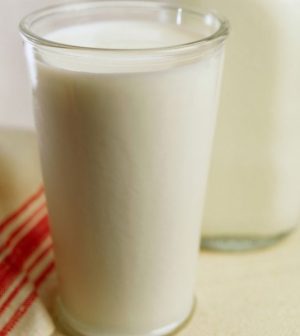- Could Your Grocery Store Meat Be Causing Recurring UTIs?
- Are You Making This Expensive Thermostat Error This Winter?
- Recognizing the Signs of Hypothyroidism
- 10 Strategies to Overcome Insomnia
- Could Artificial Sweeteners Be Aging the Brain Faster?
- Techniques for Soothing Your Nervous System
- Does the Water in Your House Smell Funny? Here’s Why
- Can a Daily Dose of Apple Cider Vinegar Actually Aid Weight Loss?
- 6 Health Beverages That Can Actually Spike Your Blood Sugar
- Treatment Options for Social Anxiety Disorder
With Bird Flu a Threat, FDA Asks Some States to Curb Sales of Raw Milk

The U.S. Food and Drug Administration on Thursday asked states to work harder to protect the public from the risks of raw milk as a bird flu outbreak continues to spread among dairy cows.
In an open letter to state and local officials, the agency urged more testing of herds that produce raw milk for sale and recommended that states use their regulatory powers to stop the sale of raw milk where dairy herds have tested positive.
On Thursday, Minnesota became the 10th state to report an infected herd. According to the U.S. Department of Agriculture, 82 U.S. herds have now tested positive for the H5N1 avian virus.
The FDA doesn’t allow the sale of raw milk across state lines, but several states allow the sale of raw milk within their borders, with varying requirements, the agency noted.
Raw milk can carry high levels of the H5N1 bird flu virus because it appears to infect cows through their udders. While it isn’t yet clear whether people can get bird flu by drinking contaminated milk, cats living on farms with infected cows have died after consuming raw milk and three dairy workers exposed to it have been infected.
“Given the current and potential future risks that HPAI H5N1 virus poses to our nation’s public health, as well as the health of our nation’s food-producing animals and wildlife, it is important to work together to minimize the additional exposure of humans and other animal species,” Dr. Don Prater, who is leading the FDA’s H5N1 response, told CNN.
Along with stronger warnings about the dangers of raw milk, the FDA is recommending that any raw milk or raw milk products from exposed cattle that are fed to calves or any other animals be heat-treated or pasteurized, the FDA said.
The agency added that it would soon share new research and data on both bird flu virus in raw milk and raw milk products.
More information
The CDC has more about bird flu.
SOURCE: U.S. Food and Drug Administration, letter, June 6, 2024; CNN
Source: HealthDay
Copyright © 2026 HealthDay. All rights reserved.










